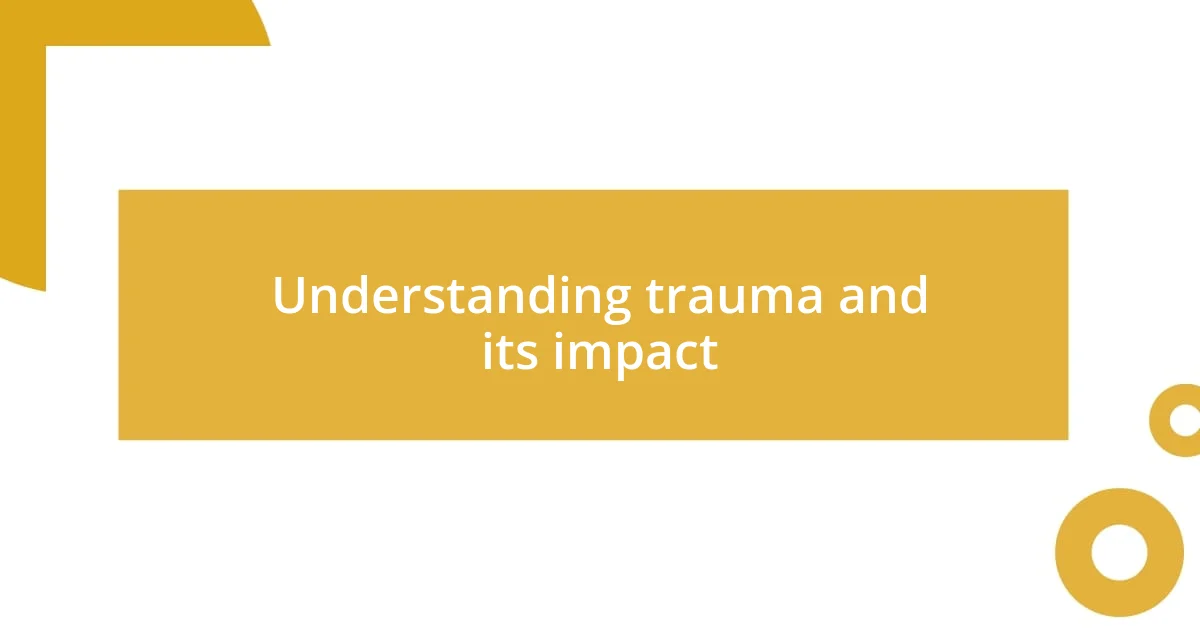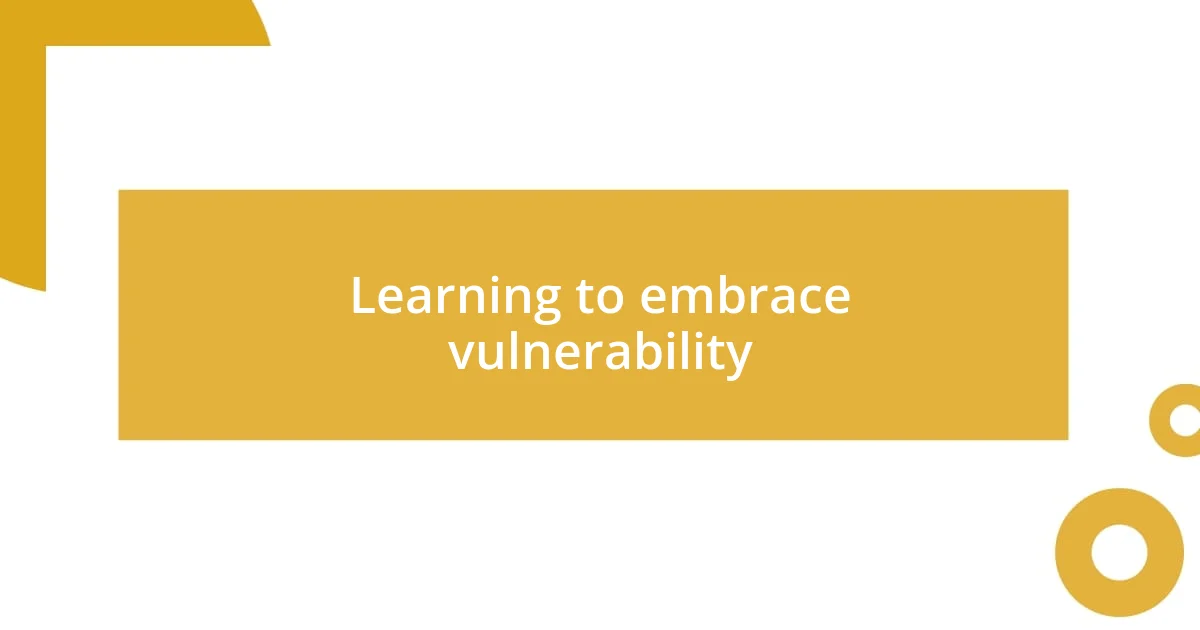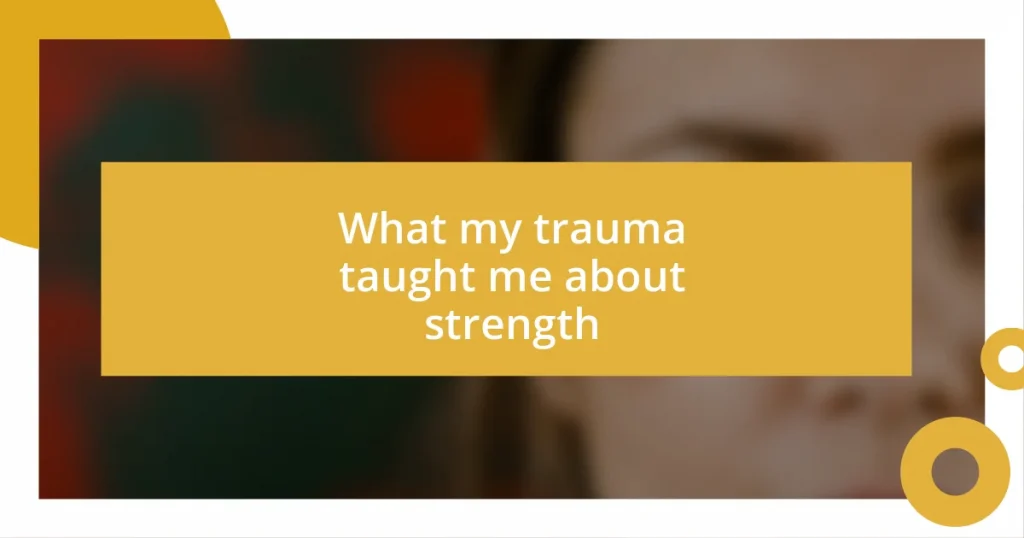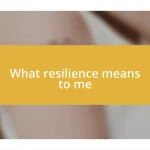Key takeaways:
- Trauma requires acknowledgment and understanding, as it significantly impacts emotions, behavior, and relationships.
- Strength can manifest through emotional regulation, seeking support, and finding meaning in struggles, reflecting resilience.
- Embracing vulnerability and sharing personal stories can transform trauma into empowerment, fostering connection and purpose.

Understanding trauma and its impact
Trauma is more than just a painful experience; it’s a profound emotional wound that can leave lasting scars on our psyche. I remember the day I faced my trauma head-on, how it felt like I was peeling back layers of my own being. Have you ever experienced a moment where you felt completely exposed, yet oddly free? That’s the paradox of trauma.
The impact of trauma often manifests in surprising ways, influencing our behavior, relationships, and even our self-worth. For instance, after my own experience, I noticed I was more irritable and withdrawn. It made me realize that our reactions to trauma can sometimes trap us in a cycle of pain, like a tightrope walker without a safety net. Why do we feel the need to hide our struggles? Could it be that vulnerability is seen as weakness in our society?
Understanding trauma requires patience, both with ourselves and others. I’ve found that while navigating my healing journey, moments of sudden clarity would often arrive when I least expected them. Have you ever heard a song that resonated with your inner turmoil? In those times, I learned that acknowledging our trauma is the first step toward reclaiming our strength.

Recognizing the signs of strength
Recognizing strength often comes in subtle forms, and I’ve learned to appreciate those quiet moments that signal resilience. I remember standing in front of the mirror, feeling the weight of my past, yet noticing the glimmer of determination in my eyes. It was a reminder that strength isn’t always loud; sometimes, it whispers.
Here are some signs I’ve recognized as markers of strength:
- Emotional Regulation: You can feel strong emotions, yet respond calmly.
- Seeking Support: Reaching out for help shows immense courage and self-awareness.
- Setting Boundaries: Knowing when to say ‘no’ protects your well-being.
- Self-reflection: Taking time to understand your feelings deepens personal insight.
- Finding Meaning in Struggle: Transforming pain into purpose illustrates your resilience.
In my journey, acknowledging these signs has empowered me to navigate my experiences with a clearer perspective. It’s as if every small victory fuels my forward momentum.

The journey of personal growth
The path of personal growth is often winding and filled with unexpected turns. I recall a time when I had to confront the very aspects of myself that I found most challenging. Each setback felt like a brick wall, but with each challenge, I discovered not just my limits, but also my capacity to push beyond them. Isn’t it fascinating how discomfort can lead to profound growth?
As I navigated my journey, I learned that personal growth isn’t a straight line; it’s more like a series of waves. There were days when I felt empowered, riding the high tide of my newfound strength. Other times, the lows were overwhelming, leaving me gasping for air. Reflecting on these ups and downs, I’ve realized that embracing both peaks and valleys is crucial. Have you ever felt that growth is more about the bumps in the road than the smooth rides?
Personal growth also flourishes in moments of vulnerability. I remember attending a support group, feeling apprehensive about sharing. But as I opened up, I discovered a sense of connection that I hadn’t anticipated. In sharing my story, I not only felt lighter but was reminded that we walk this path together. It’s in these communal moments that I’ve truly found my strength.
| Aspect of Growth | Personal Insight |
|---|---|
| Confronting Challenges | Every challenge revealed my hidden strengths, teaching me to push beyond perceived limits. |
| The Role of Ups and Downs | Riding the waves of growth, I learned to embrace both high and low moments as essential parts of my journey. |
| Vulnerability in Connection | Sharing my story in a support group highlighted the power of vulnerability in fostering strength. |

Building resilience through adversity
Building resilience through adversity is a journey that often reveals our innate strengths. I remember a particularly tough period when I felt like I was swimming against a relentless current. But it was during those moments of struggle that I discovered a profound truth: every setback carved out a path for growth. Have you ever felt that transformation blooming in the wake of hardship?
As I faced challenges head-on, I embraced the idea that resilience is like a muscle; the more we use it, the stronger it becomes. I vividly recall a time when I had to confront the fear of failure, which had always held me back. Each time I pushed through that fear, I could almost feel my resilience expanding, making me less afraid of what lay ahead. Isn’t it remarkable how each courageous step can reshape our perspective on adversity?
Sometimes, I realized that the scars we carry are not just reminders of our pain but also badges of honor. I’ve learned to celebrate the tough times for the resilience they forged within me. Reflecting on my experiences, I see how every challenge became a lesson in patience, persistence, and ultimately, strength. Isn’t it amazing how adversity can teach us about our capacity to rise, time and time again?

Practical strategies for healing
It’s amazing, isn’t it, how simple daily practices can shift our healing journey? For me, journaling became a safe space to pour out my thoughts and emotions. In those pages, I didn’t just vent; I discovered patterns in my feelings that helped me understand my trauma better. Have you ever written down your thoughts and felt a weight lift off your shoulders?
Meditation also played a significant role in my healing process. I remember my first attempt; I felt restless and frustrated. As I persisted, however, I found moments of stillness and clarity. Each session became a time to reconnect with my inner self, easing the chaos that often dominated my mind. Have you ever tried to breathe through a storm and found calm amidst the chaos?
Support systems are vital too. I found tremendous strength in surrounding myself with empathetic friends and mentors who understood my struggles. Their presence reminded me that I wasn’t alone, and it empowered me to share my journey more openly. What about you? Do you have people in your life who uplift you during tough times?

Learning to embrace vulnerability
Learning to embrace vulnerability often begins with an unsettling realization: it’s okay to feel exposed. I recall a moment after a tough breakup when I felt like laying bare my emotions was a sign of weakness. But as I opened up to trusted friends, I discovered an unexpected strength in sharing my pain. Have you ever felt that surge of connection that vulnerability can bring?
There’s a certain beauty in allowing ourselves to be seen, flaws and all. I remember standing in front of a group once, sharing my story of trauma. As the words spilled out, I felt a mix of fear and liberation. The warmth of the audience’s empathy wrapped around me like a blanket, reminding me that our true strength lies in authenticity. How liberating is it to realize that our struggles can foster deeper connections?
I’ve learned that embracing vulnerability invites resilience to flourish. Each experience of opening up has taught me a lesson—like when I talked about my anxieties in a support group. The shared stories sparked a sense of belonging I never thought possible. Isn’t it fascinating how our most profound moments of growth often arise from the courage to be vulnerable?

Transforming trauma into empowerment
Transforming trauma into empowerment often starts with reframing how we perceive our experiences. I remember sitting in a therapist’s office, grappling with the narrative of defeat that trauma painted in my mind. It was a pivotal moment when I realized these painful instances didn’t have to define me; instead, they could inform my strength. Have you ever thought about how your challenges could be a springboard for growth rather than a weight holding you down?
Over time, I learned that sharing my story was not only an act of courage but also a source of empowerment for others. During a small community event, I spoke about my journey for the first time. To my surprise, the feedback was overwhelmingly positive—people approached me with their own stories of struggle and resilience. It was incredible to see how vulnerability can create a ripple effect of empowerment. Have you considered sharing your journey and inspiring others in the process?
Integrating lessons from my trauma has transformed my outlook on life. For instance, I now actively seek opportunities to mentor others who are facing similar challenges. The sense of purpose I found in these interactions has been profoundly uplifting. Isn’t it beautiful how empowering someone else can also be a healing experience for ourselves?














